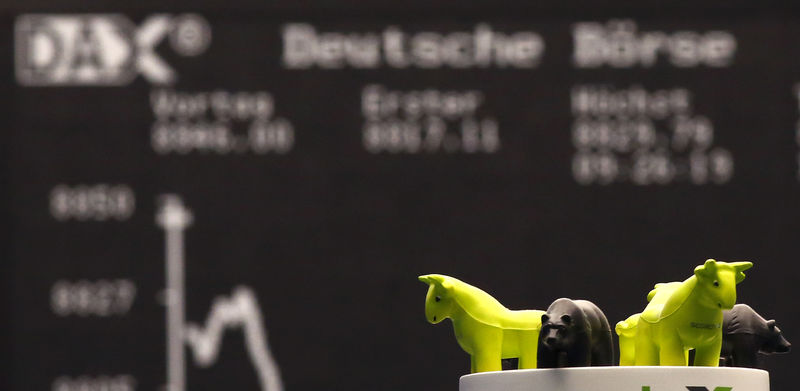By Peter Nurse
Investing.com - European stock markets traded sharply lower Wednesday, pressured by renewed energy concerns as well as a deteriorating growth outlook.
By 03:35 ET (07:35 GMT), the DAX in Germany traded 1.6% lower, the CAC 40 in France fell 1.5%, and U.K.’s FTSE 100 dropped 1.9%.
European equities are following the global move lower, with investors concerned that aggressive monetary tightening to combat soaring inflation will push much of the global economy into recession.
The European Central Bank has embarked on a series of interest rate hikes to combat inflation at historic highs, despite the region suffering from slowing growth and an energy crisis in the wake of Russia’s invasion of Ukraine.
Influential investment bank Goldman Sachs expects the ECB to hike interest rates by 75 basis points at its October and December meetings, adding to raised borrowing costs of 125 basis points at its last two meetings.
The forward-looking German GfK consumer climate index fell sharply to -42.5 in October, a drop to another record low from the downwardly revised -36.8 the previous month, as fears grow that soaring inflation stemming from dwindling Russian gas supplies will eat into incomes.
Russian gas monopoly Gazprom (MCX:GAZP) said late Tuesday that it may seek to add the Ukrainian gas pipeline operator Naftogaz Ukrainy to Russia's list of sanctioned entities, a move that would likely result in it cutting off almost all of its remaining supplies to the EU.
Russia’s energy conflict with Europe had already escalated earlier Tuesday after Nord Stream pipelines, that bring natural gas from Russia to Europe via the Baltic Sea, were wrecked in suspected sabotage.
In corporate news, Boohoo (LON:BOOH) stock fell 11.7% after the fast fashion retailer cut its full-year forecasts, citing inflation-driven costs and lower sales, while Burberry (LON:BRBY) stock rose 3.5% after the fashion house announced a new Chief Creative Officer, with Daniel Lee, the former creative head of Bottega Veneta set to join the company at the end of this month.
Oil prices fell sharply Wednesday as a build in U.S. crude stocks and further strength in the U.S. dollar outweighed any potential supply disruptions caused by Hurricane Ian.
Data from the American Petroleum Institute, released late Tuesday, showed U.S. crude stockpiles rose by much more than expected last week, up 4 million barrels, raising concerns of slowing demand at the world’s largest consumer.
Traders will be looking for official confirmation from Energy Information Administration data later in the session.
Also weighing was the dollar hitting a fresh two-decade peak earlier Wednesday, which makes dollar-denominated crude more expensive for foreign buyers.
Hurricane Ian entered the U.S. Gulf of Mexico on Tuesday and is forecast to become a dangerous Category 4 storm in the coming days.
Preparations for its impact have resulted in about 190,000 barrels per day of oil production, or 11% of the Gulf's total being shut-in, according to offshore regulator the Bureau of Safety and Environmental Enforcement.
By 03:35 ET, U.S. crude futures traded 2% lower at $76.92 a barrel, while the Brent contract fell 1.8% to $83.31.
Additionally, gold futures fell 0.7% to $1,624.25/oz, while EUR/USD traded 0.4% lower at 0.9555.
